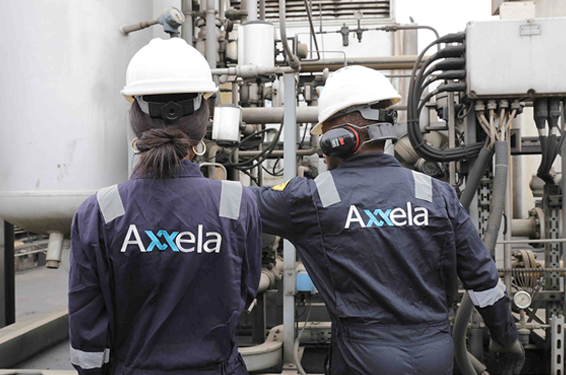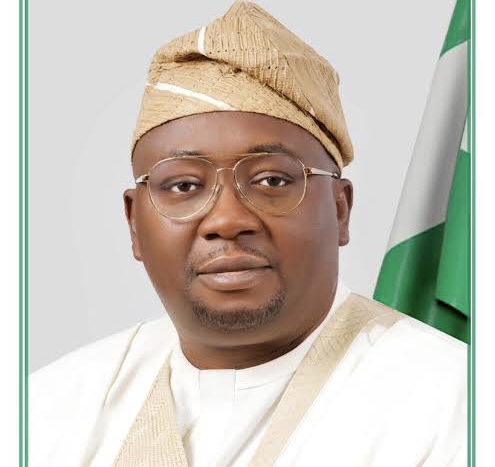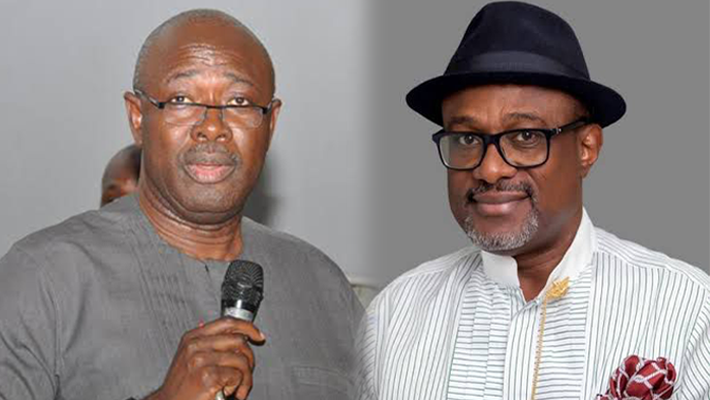Energy
Nigeria-Siemens power project: FG targets 25,000mw by 2025
The Federal Government is set to unveil and deploy the first set of power equipment procured under the Presidential Power Initiative, popularly known as Nigeria-Siemens power project, with projections to exceed 25,000 megawatts(mw) by 2025.
Speaking in Lagos yesterday, the Chief Executive Officer, Federal Government of Nigeria Power Company (FGNPC), Mr. Kenny Anuwe, also disclosed that the inauguration of equipment would begin in the next two or three weeks.
Anuwe, while speaking to journalists at the on-going Nigeria Energy Exhibition and Conference, said the company would ramp up electricity supply to 7000 mw by 2024 as promised Nigerians and exceed 25,000 mw by 2025.
He said the first inauguration ceremony would begin at a location in Lagos, while the second set of equipment would be unveiled in Abuja.
Anuwe said the latest milestone showed the determined effort of the government to improve the supply of electricity to Nigerians.
“We will be seeing commissioning of these projects in the next two to three weeks, and every month after that until the end of the programme,” Anuwe said.
He stated that the equipment, which included transformers and mobile substations, were procured under the IPP in partnership with Siemens Energy, the implementing partner.
Anuwe said the equipment were purpose-designed to meet Nigeria’s power supply needs in a phased programme that would see to the generation and distribution of 25,000 megawatts (mw) of electricity by 2025.
He added that the company was set to commence the unveiling of the first set of the power equipment that had already arrived the country, stressing that the aim is to sustain the tempo until power disruptions in the country becomes a thing of the past.
Anuwe stated optimistically that with the new equipment, power supply would rise to a minimum of 7,000 megawatts, and assured that the company was committed to executing its plans until all the targets set towards ending power disruptions in the country were met.
According to him, “The Federal Government is determined to make a difference in the lives and livelihood of Nigerians, and with the pace of work being put in the project so far, I think we would exceed 7,000mw. This is our first objective, and we are not taking our eyes off that ball. We want to hit that target and exceed it, and that is a confirmation that improvement in electricity supply is absolutely doable.”
He maintained that FGNPC adopted a transparent and sustainable model that would deliver on the objectives of the project across the electricity supply value chain, a procedure he believed would win the trust and support of Nigerians.
Admitting that the energy needs of a country of Nigeria’s size and capacity exceeded 7,000mw, he said the set threshold was a minimum target that would continually be improved upon until the average Nigerian had access to electricity supply without recourse to the more expensive and environmentally hazardous alternatives.
Anuwe explained that FGNPC was established by the Federal Government as a special purpose vehicle for the implementation of the PPI, in an effort to make the task of ramping up electricity supply easier.
He stated, “The FGN Power Company was set up as a special purpose company to implement the PPI. But its core mandate is in three broad categories. Number one is to secure financing for the programme; number two, to engage with stakeholders right across the value chain, and number three, to coordinate the implementation of the Presidential Power Initiative.
“It also includes engagement in Engineering and Procurement Contracts (EPC) and Master Content Management (MCM), all fashioned to deliver for Nigerians, all the objectives set in the PPI.”
On the role of the generating companies (Gencos) and distribution companies (Discos) under the new order, Anuwe explained that the establishment of FGNPC did not impact the role of the players in the electricity value chain since the arrangement took the form of a partnership than role absorption.
He said, “The Gencos and the Discos will continue to play their part in the value chain of delivering energy to consumers right across Nigeria.
“What will be different is that they will now have a partner in FGN Power Company that is enabled to actually implement a programme that supports their businesses in sustainable ways, while strengthening their capabilities to deliver value to their customers.”
The FGNPC boss praised the partnership between Nigeria and FGNPC on the one hand, and the German government and Siemens Energy, on the other, explaining that the relationship will bear long term benefits to Nigeria and its people.
Anuwe described the German firm as a world leader in equipment manufacturing, who are playing the role of a partner, while also providing support in financing and other technical aspects of the project.
Beyond their role as original equipment manufacturers (OEMs), he said Siemens was also in the project as implementation partners supporting Nigeria by enabling financing.
Energy
Axxela announces to develop 50 MMSCF/D gas processing plant

Axxela Limited, a leading gas and power portfolio company in Sub-Saharan Africa, announces that it has taken Final Investment Decision for the development of a gas processing plant situated in OML 56, Delta State, South-South Nigeria.
This strategic investment marks yet another significant stride towards delivering on Axxela’s commitment to deepen domestic gas utilisation in Nigeria. The gas processing plant with a total capacity of 50 MMSCF/D will be delivered in phases.
The first phase will comprise a 12 MMSCF/D modular plant, with an interconnection pipeline network of about 4km alongside other ancillary infrastructure. The facility is expected to commence operations by the end of 2024.
Speaking on this pivotal landmark, Director of Business Development, Axxela, Franklin Umole said, “As the Federal Government continues to pursue its Decade of Gas and Energy Transition Agenda, we remain a reputable private sector partner with the capacity to develop gas processing plants aimed at tackling the longstanding challenge of gas flaring and commercialisation in Nigeria.
“We are positioning to develop requisite infrastructure for natural gas processing and last mile distribution that creates market access for at least 20% of Nigeria’s gas demand.
“Over the past two decades, we have been at the forefront of natural gas advocacy, and this project is a further reaffirmation of our dedication to gas infrastructure development and our vision to deliver innovative energy solutions across Nigeria and Africa,” he concluded.
Following the Board’s Final Investment Decision, Axxela has executed a long-term feedstock supply agreement with a leading indigenous upstream player and established equipment supply arrangement with world class Original Equipment Manufacturers (OEMs) to assure quality delivery of the project. The design concept is based on a fast and modular expansion as Axxela is partnering with OEMs who have ready stock of equipment for deployment.
The project is strategically cited in OML 56 to serve as a potential hub which upstream players with fields within a 30km radius can partner with to process associated and non-associated gas.
Axxela believes in the potential of this central processing hub having identified two prospective fields and with the partnership with the OEMs, the company envisages that the plant’s output can be scaled up to 50 MMSCF/D within 18 months.
Beyond unlocking economic opportunities, the project can potentially transform gas flaring into a valuable resource that will further ensure a stable, cleaner energy for domestic utilisation thereby contributing significantly to annual CO2 emissions savings and supporting environmental sustainability.
Upon completion, processed gas from the facility will be readily available for utilisation across various market segments including Compressed Natural Gas (CNG) for vehicles, feedstock for industries, decentralised power solutions among others.
Energy
Electricity supply: Power Minister decries activities of saboteurs, cartels


The Minister of Power, Mr Adebayo Adelabu, has decried the activities of saboteurs and cartels in the electricity sector, blaming them for the incessant power outages in the country.
Adelabu expressed this during a programme tagged “Confronting Nigeria’s Power Challenge as the Nation Migrates to a Multi-Tier Electricity Market” on Tuesday in Abuja.
The programme was organised by the House of Representatives Committee on Power.
The Minister said saboteurs and cartels perpetrated evil for their selfish interests in order to frustrate efforts at ensuring stable electricity supply in the country.
“We have saboteurs, cartels, and those who prefer to perpetrate evil for their selfish interests to frustrate our efforts,” Adelabu said.
He said all efforts must be geared towards propelling the country to the league of productive nations, adding that Nigeria was looking at reserves that would eliminate incessant power collapse.
He said the Federal Government was considering the liberalisation of the power sector.
“We also encourage the state government to invest in power generation in their states,” the Minister said.
Adelabu listed Abia as one of the states that had invested in power, adding that the Federal Executive Council (FEC) had also granted Ekiti and Enugu State the right to generate tariffs.
The Minister said it was worrisome that a lot of investors did not come with their private equity, but had to borrow money from the bank to operate in the sector.
He, however, said that with time, investors would be made to operate the right way for the benefit of the sector.
The Minister also said that FG was looking at deepening rural electrification, adding that it would be done in collaboration with the state governments.
Adelabu said there were over 100 uncompleted power projects across the country, adding that those projects would not be energy-efficient without being completed.
Speaking, Group Managing Director, Sahara Power Group, Mr Kola Adeshina, expressed the regret that Nigeria could not supply electricity efficiently in spite of its abundant gas resources.
He said if electricity was not a priority in budget provision, it would be difficult for the country to work.
Adeshina said Nigeria had the resources to double its power generation.
“If the executive brings an appropriation bill before you(lawmakers) and the power sector is not number two after defence, then don’t allow it,” he said.
He urged the government to prioritise industrial areas in power distribution.
“After the industrial areas have had light during the day, we can shift power at night to residential areas because production takes place during the day.
“Let’s sequence our investment along the line of value-added. Nigerians are resilient, we are strong, and we have tenacity. Nigerians are tired of power collapse,” he said.
Energy
Alleged $500m wasteful investments: Oil Minister dares Former NCDMB ES, vows to recoup investments


The Minister Of State For Petroleum Resources(Oil), Sen. Heineken Lokpobiri has vowed to recoup alleged investments worth over $500m made by the Nigerian Content Monitoring and Development Board (NCDMB).
The Minister made this vow in defence of his allegation that the NCDMB wasted over $500 million of the industry’s fund in equity investments in private establishments and in loans that are now non-performing.
The erstwhile Executive Secretary of the NCDMB, Engr.Simbi Wabote had earlier debunked the Minister’s statement describing it as reckless.
Wabote challenged the Minister to visit the sites of the projects the agency invested in while accusing the Minister of playing politics.
“The HMSPR-Oil is implored to visit the construction sites to avail himself of facts on ground. He should also check the MPR archives of the stategic plan to diversify oil and gas development clusters in the NigerDelta using Bonny Island, Brass Island, Onne, Ogidigben, Ibom, etc. Perhaps, this will cure his aversion to
any developmental initiative in Brass
Island and the Niger Delta in general.” Wabote said.
Reacting to Wabote’s statement, the Minister through his SA Media and Communication, Nneamaka Okafor, described Wabote’s claims as blatant lies from the pit of hell.
The Minister’s response reads: ‘’Our position is that he who alleges must prove same. So, if Mr. Wabote has proof of such conversation, he is challenged to provide same.”
‘’Secondly the Minister has no aide called Blackson. All his aides were duly selected in line with extant laws and have documents to that effect.”
‘’The Minister in his capacity as chairman of the Governing Council stands by his statement at The Petroleum Club’s quarterly event in Lagos, and as journalists I welcome you to visit the places mentioned to verify the allegations for yourself.”
‘’Thirdly, the said Atlantic Refinery was supposed to be built in Mr Wabote’s home town, he should show Nigerians where that refinery is.”
‘’Fourthly, the Brass Fertilizer and Petrochemical company was also paid for, you are welcomed to also visit the site to verify the facts for yourself.”
‘’Let me add that these revelations are not new, they were first made during an investigative hearing of the House of representative committee on local content. Again the records are there and you are welcome to verify these facts.”
‘’The Minister has never been part of any budgeting process of any parastatal under the Ministry, you are welcomed to visit these agencies to verify for yourself.”
‘’Finally, the Minister’s office is run with a budget superintended by the permanent secretary and so one will wonder, how the Minister will ask another entity to make provisions for the budget of his Office. The Minister has an impeccable record from his time as Minister of Agric and will continue to stand for the truth.”
‘’I have had course to read Mr Wabote’s release and every one can see that he is still nursing the wounds of being replaced even after spending seven years at the Board.At best, this is a clear case of when you fight corruption, corruption will fight back.” The response read.
The Minister also diaclosed that investigations are ongoing while making a vow to recover the resourced expended.
-
Finance3 months ago
Court orders Sen. Victor Umeh to repay N136m bank debt to AMCON
-



 Abuja Update2 months ago
Abuja Update2 months agoUNDP, FG partnership needed to achieve inclusion, equity- Minister
-
Abuja Update1 month ago
Banks drive stock market performance with N147bn gain
-



 Infotech4 weeks ago
Infotech4 weeks agoWorld Backup Day: NITDA urges Nigerians to ensure backup of data
-
capital market2 years ago
Rt.briscoe, FBNH, Others halts negative performance of stock market
-



 Health3 weeks ago
Health3 weeks agoImmunisation: FG, GAVI seek synergy with Sokoto Govt.
-



 Health1 week ago
Health1 week agoCapacity training will reduce migration of health workers- NPHCDA
-
Infotech2 weeks ago
Forex for Beginners: Unveiling the currency exchange and how to trade it




